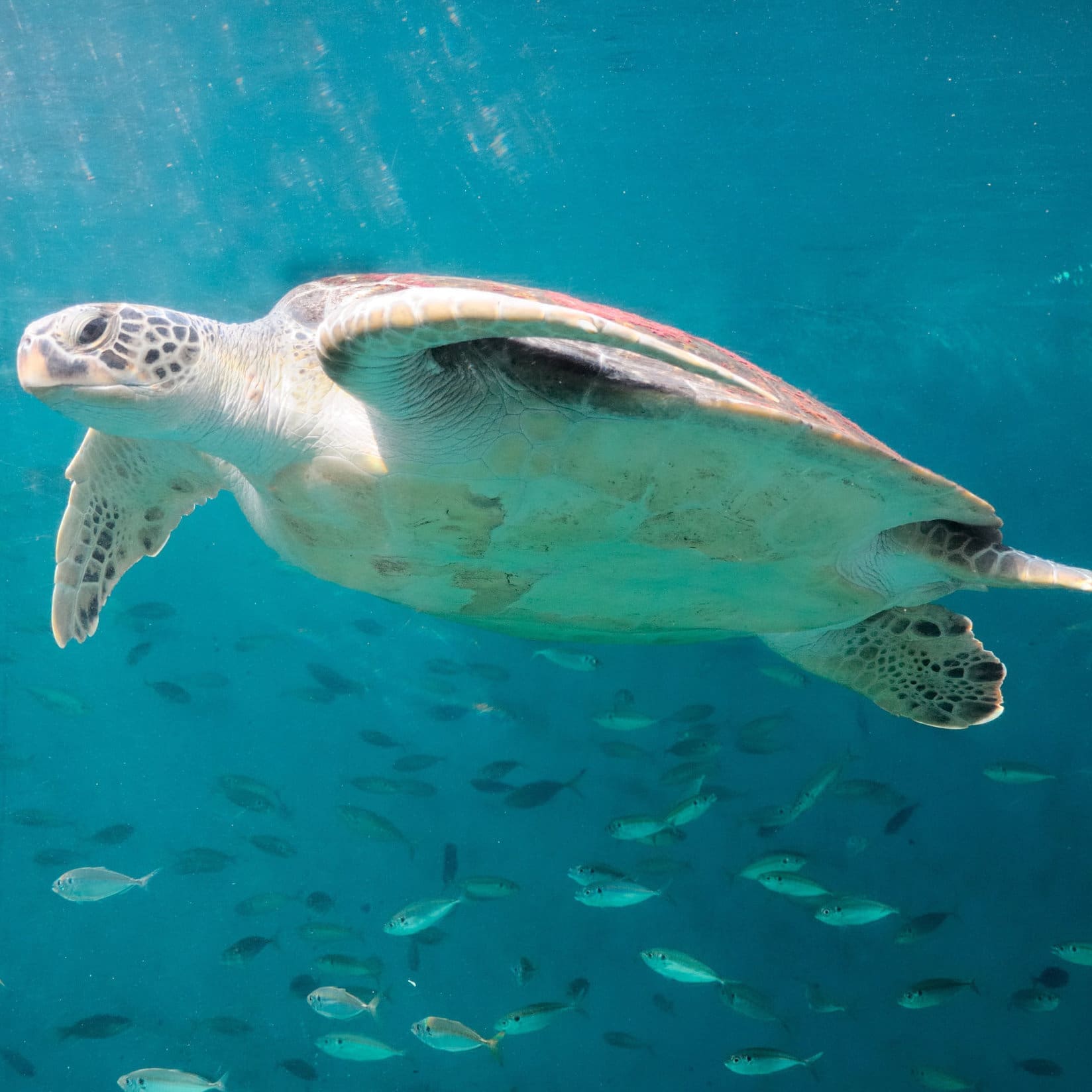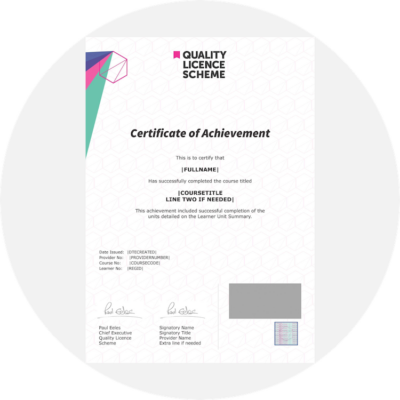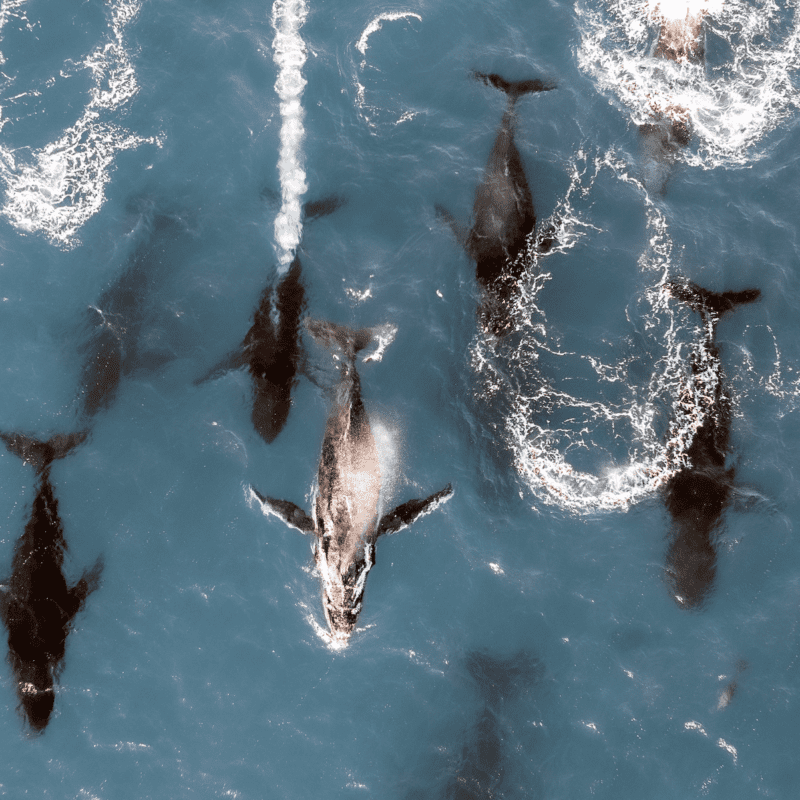
Awarding body:
Skills and Education Group
Study time:
12 months
Study method:
Online
£299.00
Marine Biology is a fascinating area of science which is very important in the fight to save our planets vital ecosystems. Our Marine Biology Level 3 course gives a sound understanding of all areas of ocean life and how humans have an impact on marine animals.

Choose your enrolment options
About this Marine Biology Level 3 Course
In our Marine Biology Level 3 course you will gain an understanding of the variety of marine life found on Earth. We will study habitats and wildlife in oceans from coral reefs and algae to large ocean predators. Human conservation and impact is a big part of the course which will be fully explained to increase your awareness of how we interact with natural ocean ecosystems.
| Study Time: | 100 hours |
| Enrolment length: | 12 months |
| Course Format: | Online |
| Entry Requirements: | None Specific |
Upon completion of this course students receive a Quality Licence Scheme certificate and an OLC Certificate. All certification fees are included in your course fees.
Marine Biology Level 3 Certification
To complete this Marine Biology Level 3 course you will need to submit, and pass, all of the tutor marked assignments. There are six assignments in the course and no need to purchase any textbooks as we provide all of the lessons and materials required to learn the syllabus. All assignments are coursework based and are in an essay/question and answer style to test your knowledge of the topics covered in each of the course sections.
Course Content
This course assesses the following units:
Unit 1: The Physical Ocean
In this, the first unit of the course, we explore how the oceans came to be as they are today, how the movement of land masses on the planet shaped them and created separate seas and oceans and how the delicate balance of chemicals in seawater makes it ideal for supporting life. We also discover ways in which we can describe different areas and zones of the ocean using distinguishing features.
Unit 2: Evolution in the oceans
One of the most enduring theories of how life first emerged on our planet suggests that it happened deep in the young planet’s changing seas. Initially acidic, devoid of oxygen and uninhabitable, it is thought that specialist bacteria that were adapted to these harsh conditions gradually changed the oceans; adding oxygen, removing sulphur and removing acid until there was an explosion of new lifeforms with weird and wonderful body plans and adaptations to survive in different parts of the ocean. We expand on this idea in this unit, considering how life might have blossomed from those early bacteria. We encounter some of the scientists whose work continues to develop our understanding of where life came from, and we explore how life evolved before evaluating the idea of the survival of the fittest and the origin of the species. We will also use a system called taxonomy, that we use to neatly identify organisms and distinguish them from one another.
Unit 3: Marine habitats
In this unit we explore the conditions and the challenges facing the inhabitants in three very different marine environments. The intertidal, the ocean’s fringes where the land meets the sea, the lightless abyss of the aphotic zone and the deep, barren pelagic zone. Much of the ocean is classified as pelagic, and we will discover the enormous distances that pelagic animals must cover simply in search of their next meal or a mate with whom to reproduce.
Unit 4: Ocean extremes
At opposite ends of the temperature scale, the poles and equatorial, tropical regions are extreme environments for entirely contrasting reasons. In this topic, we will discover how the North and South poles of our planet are far more different than they initially seem. We will also explore how tropical environments lend themselves to the emergence of remarkable coral reefs
Unit 5: Marine organisms
In the previous two units, we have looked at some of the relationships between different types of organisms within a marine ecosystem. In this unit you will explore more about the animals and the species that fill these different ecological niches and roles, how they are suited to their position in their food chain and how they have adapted to suite their environment.
Unit 6: Human impact and conservation
It is now very much common knowledge that over human history, we have done untold damage to our environment. From polluting the atmosphere, damaging the protective ozone layer, and creating acid rain that eats away at rock and kills plants, to pollution of rivers from the runoff of fertilisers and pesticides used on farmland. But if there is one place where our impact has been felt more than any other, it is in our oceans. In this final unit of the course, we explore the impact we have had on our oceans, identifying causes and implications of different types of damage, but crucially investigating how we can fix this and protect our oceans for future generations.
Online study and instant enrolment
All of our students are given access to our Online Campus through their own personal login and password. As soon as you complete your enrolment, you would have immediate access to your account which allows you to make a start working through the lessons. Tackle your assignments as your own pace and contact your tutor to access any help and support you need. The course itself is set out in a very simple layout, making it easy to work through the topics and complete your assessments.
Our Online Campus includes:
- Instant enrolment – access everything on your course from the moment you enrol.
- Personal account logins – login any time, 24/7.
- Full support throughout – message your tutor, use our online chat or give us a call.
- Online assignment submissions – upload work online from the comfort of home.
- Self-led learning – study at your own pace so you can pass much faster.
- Safe e-portfolio system – store all of your work in your account.
- Progression tracking – easily see what assignments you have left to complete.
- Details help centre – get instructions and guidance every step of the way.
- Unlimited attempts – submit as many attempts at your assignments as you need.
Unlimited assessment submissions
All of the assessments for this course are completed through our Online Campus. You can attempt each one as many times as needed to ensure you pass. After every attempt, your tutor will provide detailed feedback and tips on how you can improve going forward. Quickly see your progress during your studies by checking your progress bar and seeing the remaining assessments you need to complete.
Get full tutor support
Throughout your enrolment with the Online Learning College, you can access support at any time you need. All students are assigned a personal tutor who will mark all of your work and provide detailed feedback after every submission. Your tutor will be an industry expert with a full knowledge of the course content and will be able to help you at any point along your learning journey. One of the best tools at your disposal is your tutor – you can ask as many questions of them as you wish to and they will be happy to help at any time.
We also have a brilliant support team on hand and available through email, online chat and over the phone. This team is there to help with any questions which are more generic, such as providing support in submitting work through your account or getting your certificate when you have completed your course. We pride ourselves on ensuring the support you receive is the best in the business – help and guidance is fast and detailed every time you contact a member of the team.
Assessments
To pass this course learners must pass 6 assignments. These are completed after navigating through the corresponding lessons and writing your answers to assignment questions. Once these have been read and marked by your personal tutor, feedback and marks are provided to students which contain helpful tips to improve work in future assignments.
Enrolment Length
All of our courses are allocated plenty of time for students to complete their studies and all materials are self-led so that you can complete the course at your own pace, but you have access to the course on the Campus for 12 months from your enrollment date. Should you require additional time on one of our courses you can extend your enrolment by 30 days for an additional fee of £60. As well as this we operate a 14 day money back guarantee on every one of our qualifications- that’s how confident we are of how you will love studying with us!

Quality License Scheme Certification
At the end of this course, successful learners will be given the option to receive a Certificate of Achievement from the Quality Licence Scheme and a Learner Unit Summary (which lists the components the learner has completed as part of the course).
Quality License Scheme Certificate
All Certification Costs Included
Frequently Asked Questions
Learn more about this course and others that we offer. If you still have any questions, simply contact our course advisors on 0800 772 0887 or email info@ol-college.com.
What is included in this Marine Biology Level 3 course?
All of our courses come with everything you need. Your lessons, tuition and certification costs with the Quality Licence Scheme are included in the cost of this course. There is nothing else that you need to buy or pay for in order to finish the course and get your certificate.
Is this course regulated?
At the end of this course successful learners will be given the option to receive a Certificate of Achievement from the Quality Licence Scheme and a Learner Unit Summary (which lists the components the learner has completed as part of the course).
The course has been endorsed under the Quality Licence Scheme. This means that Oakwood Home Learning has undergone an external quality check to ensure that the organisation and the courses it offers, meet defined quality criteria. The completion of this course alone does not lead to a regulated qualification* but may be used as evidence of knowledge and skills gained. The Learner Unit Summary may be used as evidence towards Recognition of Prior Learning if you wish to progress your studies in this subject. To this end the learning outcomes of the course have been benchmarked at the level shown against level descriptors published by Ofqual, to indicate the depth of study and level of demand/complexity involved in successful completion by the learner.
The course itself has been designed by Oakwood Home Learning to meet specific learners’ and/or employers’ requirements which cannot be satisfied through current regulated qualifications. The Quality Licence Scheme endorsement involves robust and rigorous quality audits by external auditors to ensure quality is continually met. A review of courses is carried out as part of the endorsement process.
The Quality Licence Scheme is part of the Skills and Education Group, a charitable organisation that unites education and skills-orientated organisations that share similar values and objectives. With more than 100 years of collective experience, the Skills and Education Group’s strategic partnerships create opportunities to inform, influence and represent the wider education and skills sector.
The Skills and Education Group also includes two nationally recognised awarding organisations; Skills and Education Group Awards and Skills and Education Group Access. Through our awarding organisations we have developed a reputation for providing high-quality qualifications and assessments for the education and skills sector. We are committed to helping employers, organisations and learners cultivate the relevant skills for learning, skills for employment, and skills for life.
Our knowledge and experience of working within the awarding sector enables us to work with training providers, through the Quality Licence Scheme, to help them develop high-quality courses and/or training programmes for the non-regulated market.
*Regulated qualification refers to those qualifications that are regulated by Ofqual / CCEA / Qualification Wales
Do I have to sit an exam?
No, there are no exams for this Marine Biology Level 3 course. Everything is assessed through coursework and assignments which you can submit at anytime within the enrolment term.
Am I assigned a tutor for this Marine Biology Level 3 course?
You are! Once you have enrolled then you will have an assigned tutor, this person is the one who will be marking your work, providing feedback, and passing your work. If you need to speak to your tutor at any time throughout your enrollment then you can message them via the campus and they will reply within 24 hours of out working hours.
Can I speak to someone before I enrol?
Of course! We have course advisors and a customer service team in the office Monday to Friday 9am until 5pm who will be happy to help and answer any questions that you may have. You can call us on 0800 772 0887, email us at info@ol-college.com or we even have a live chat facility.
How long do I have to study?
The enrolment term is 12 months, however, as long as you complete all of the written assignments and practical tasks (if applicable) then you can complete the course sooner if you wish. If you need any additional time after the 12 months then you can also extend which costs £60 per month and you can do this as many times as needed.
What are the payment options?
There are various payment options for this Marine Biology Level 3 course. The first option will be for you to purchase the course and pay in full upon enrolment. The second option is the pay monthly option, this is completely interest free and splits the cost into 12 monthly payments. Finally, we can send an invoice with 30 days payment terms if your employer will be funding the cost of the course – if you would like this option, then please ask your employer to get in contact with us so we can provide them with the details we will need.
Do you offer any funding for the course?
Unfortunately we don’t offer any free or funded courses but you can split the cost into 12 monthly payments which is completely interest free.
Do I need to buy anything else for this Marine Biology Level 3 course?
Everything that you will need will be provided to you when you enrol, you will also need to complete some of your own research too. Buying text books and other resources can become costly so we don’t ask you to or recommend buying anything, there is lots of free and very useful information online!
How do I see my course material/resources?
Everything that you will need for your course will be accessible on our online campus. You can select the online and paper versions of most of our courses too, if you select this option then there will be an additional £35 cost, this covers the cost of us printing out a full course pack in a ring binder folder and sending out via Royal Mail 1st Class, Tracked & Signed delivery.
How do I log in and access my course?
Once you have enrolled then you have access to the campus right away to get started on your course. You can log in by going to our website and clicking ‘Log in’ at the top right hand side of the page. Your username is the email address that you used to enrol and your password is the one you created at the checkout when enrolling.
When will I receive my certificate?
Once you have completed and passed all units and your course is paid in full (either paid in full upon enrolment or if paying monthly then the remaining balance paid or monthly payments complete), then we can request your certificate from the Awarding Body. Certificate’s take 6-12 weeks to arrive with us and once we receive it we will then contact you to confirm the address to post it to. Certificate’s are sent via Royal Mail 1st Class, Tracked & Signed delivery.
What happens if I fail an assignment?
If you fail an assignment, then please do not worry! You can resubmit your assignment as many times as needed until you pass. Each time you submit an assignment then your tutor will mark it and provide feedback, you can then make the amendments and resubmit and have the new version marked again.
How long does it take to mark my work?
We have a marking timescale of 5 working days from the submission, your tutor will mark your work and provide feedback with if you need to make any amendments to enable you to pass. Please note, we do ask that learners don’t upload more than one submission at a time as this will delay the marking not just for yourself but for other learners too.
Do I have to attend or view any live/virtual lessons?
You don’t, everything is in written, text, image and diagram format. You will have access to the campus 24/7 to be able to log in and complete your work. You won’t need to view any videos or audio lessons.
What device can I/shall I use?
As you will have assignments to write and type up for submission then we would recommend using a computer or laptop for this as you will need to use a software such as Microsoft Word or Google Docs to type these. You may also be able to use an iPad/tablet for this. You can use a smartphone if you wish but you may find it difficult and it would probably be easier on a larger screen/device.
How do I complete my assignments?
Once you have enrolled and accessed the campus you will see your assignment tasks and criteria of what needs to be covered in each assignment.
Our latest reviews
Fully supported by an online tutor
Our courses come with full tuition from an expert tutor. Your tutor can be contacted through our messaging system, and the same person will provide feedback on your assignments. We also have a dedicated admin team on hand to help over the phone, through live chat, and by email.
1 working day for replies to messages
5 working days for feedback on assignment
Our turnaround times are the best in the industry!

Start today with immediate enrolment
Expert support at all times
Our speedy support promise
When you study with us, we ensure a speedy service. That's why our current timeframes for marking and support are the best in the business.






